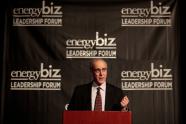Hot Button Issues In Energy
Journalists Look Back, Look Forward

Huge questions loom over the world of energy in 2011.
How they are handled will determine the fate of multi-billion dollar energy corporations, the pocketbooks of consumers, the fortunes of the overall economy and the quality of the environment.
The trajectories of a variety of revolutionary energy technologies will be closely tracked by a vast ecosystem of energy companies, utilities, vendors, legislators, regulators, special interest groups.
To better make sense of how public perceptions of the future course of the energy sector may develop in 2011, in recent days I have surveyed a variety of leading U.S. energy journalists.
Matthew Wald, New York Times energy writer, said that it is hard to predict what the top energy issues of 2011 will be.
"This isn't a great field for predictions," he said. "If you'd asked me this question a year ago, offshore drilling would not have been on my list. With that caveat, I expect to continue writing about transmission issues, and the progress - or lack of progress - on the nuclear renaissance, offshore wind, cellulosic ethanol and energy storage."
Steve Mufson, senior energy writer for the Washington Post, said that he will be tracking oil prices, particularly if they top $100 a barrel, and the surge in natural gas production, particularly from shale.
Another key story, Mufson said, will be the Obama administration "playing defense" on energy with the Republican controlled U.S. House of Representatives, He will also track the future of federal loan guarantees for nuclear power.
John Carey, former senior energy writer for BusinessWeek and now a freelance editor, expects much of his work to center on the long-term fate of fossil fuels. "The biggest question I will be following, I think it's whether any real progress will be made in reducing the use of fossil fuels or at least changing the curve - from both the policy and business standpoint, and across all sectors, from power plants to automobiles - and, if so, what the consequences will be."
David Biello, who heads up energy coverage for Scientific American, said, "For me, it's hard to pin down just one question I'll be tracking in 2011 because there are so many things I'll be following."
His top concerns: "Is the nuclear renaissance in the United States stillborn? How high will oil prices go? Why aren't biofuels working? Can carbon capture and sequestration make a go of it in the absence of domestic or international climate efforts? Can renewables continue to grow?"
A number of journalists expect that China's growing energy muscle will be a major story in 2011 and beyond - affecting energy developments in the United States. "The primary driver behind a lot of these questions is how will China meet its growing energy demand in 2011," Biello said, "and what will the 12th Five-Year Plan hold?"
Wald and Carey were moderators at the the EnergyBiz Leadership Forum last March, and Mufson and Biello will moderate the upcoming Forum Feb. 28 - March 1.
Each year I cultivate a mountainous pile of intriguing, potentially momentous energy articles that appear in leading publications. A few of the most significant from 2010:
Breaking Away from Coal - Price of Natural Gas Leads Some Utilities to a Cleaner Option - the New York Times, Nov. 30.
How Shale Gas is Going to Rock the World - Huge discoveries of natural gas promise to shake up the energy markets and politics. And that's just for starters, the Wall Street Journal, May 10.
Dirty Coal, Clean Future - The Atlantic, December.
Turmoil in the Power Sector - Falling Electricity Demand Trips Up Utilities' Plans for Infrastructure Projects, the Wall Street Journal, Jan. 14.
A Project to Harvest Wind Wins Praise, and Backing - Google and Investment Firm Support Plans for Offshore Power Grid in Atlantic- the New York Times, Oct. 12.
A Union Challenges China - U.S. Steelworkers See Illegal Subsidies in Clean Energy Industry - the New York Times, Sept. 10.
China Tops U.S. in Energy - Asian Giant Emerges as No. 1 User of Power, Reshaping Oil Markets, Diplomacy - the Wall Street Journal, July 20.
These matters, and many more, will continue to demand attention in the weeks and months ahead.
For more discussion on coal, nuclear and the future of renewable energy, join us at the 3rd Annual EnergyBiz Leadership Forum, the most influential gathering of power industry executives in the United States. Visit www.EnergyBizForum.com for more information.
Copyright © 1996-2010 by CyberTech, Inc. All rights reserved.
To subscribe or visit go to: http://www.energybiz.com